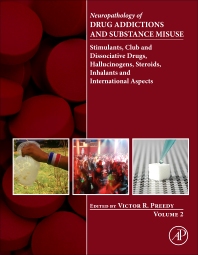Books in Addictions
Books in Addictions

An Evolutionary Approach to Understanding and Treating Anorexia Nervosa and Other Eating Problems
- 1st Edition
- January 30, 2024
- Shan Guisinger
- English

The Psychology and Neuroscience of Impulsivity
- 1st Edition
- December 1, 2023
- Yuliya Richard + 1 more
- English

The Handbook of Alcohol Use
Understandings from Synapse to Society- 1st Edition
- January 17, 2021
- Daniel Frings + 1 more
- English

Adolescent Addiction
Epidemiology, Assessment, and Treatment- 2nd Edition
- March 1, 2020
- Cecilia A. Essau + 1 more
- English

Cognitive, Clinical, and Neural Aspects of Drug Addiction
- 1st Edition
- January 10, 2020
- Ahmed Moustafa
- English

Anger Management Based Alcohol Treatment
Integrated Therapy for Anger and Alcohol Use Disorder- 1st Edition
- November 30, 2018
- Kimberly Walitzer + 2 more
- English

The Neuroscience of Cocaine
Mechanisms and Treatment- 1st Edition
- May 16, 2017
- Victor R. Preedy
- English

Addictive Substances and Neurological Disease
Alcohol, Tobacco, Caffeine, and Drugs of Abuse in Everyday Lifestyles- 1st Edition
- February 18, 2017
- Ronald Ross Watson + 1 more
- English

Handbook of Cannabis and Related Pathologies
Biology, Pharmacology, Diagnosis, and Treatment- 1st Edition
- December 31, 2016
- Victor R. Preedy
- English

Neuropathology of Drug Addictions and Substance Misuse Volume 2
Stimulants, Club and Dissociative Drugs, Hallucinogens, Steroids, Inhalants and International Aspects- 1st Edition
- March 25, 2016
- Victor R. Preedy
- English